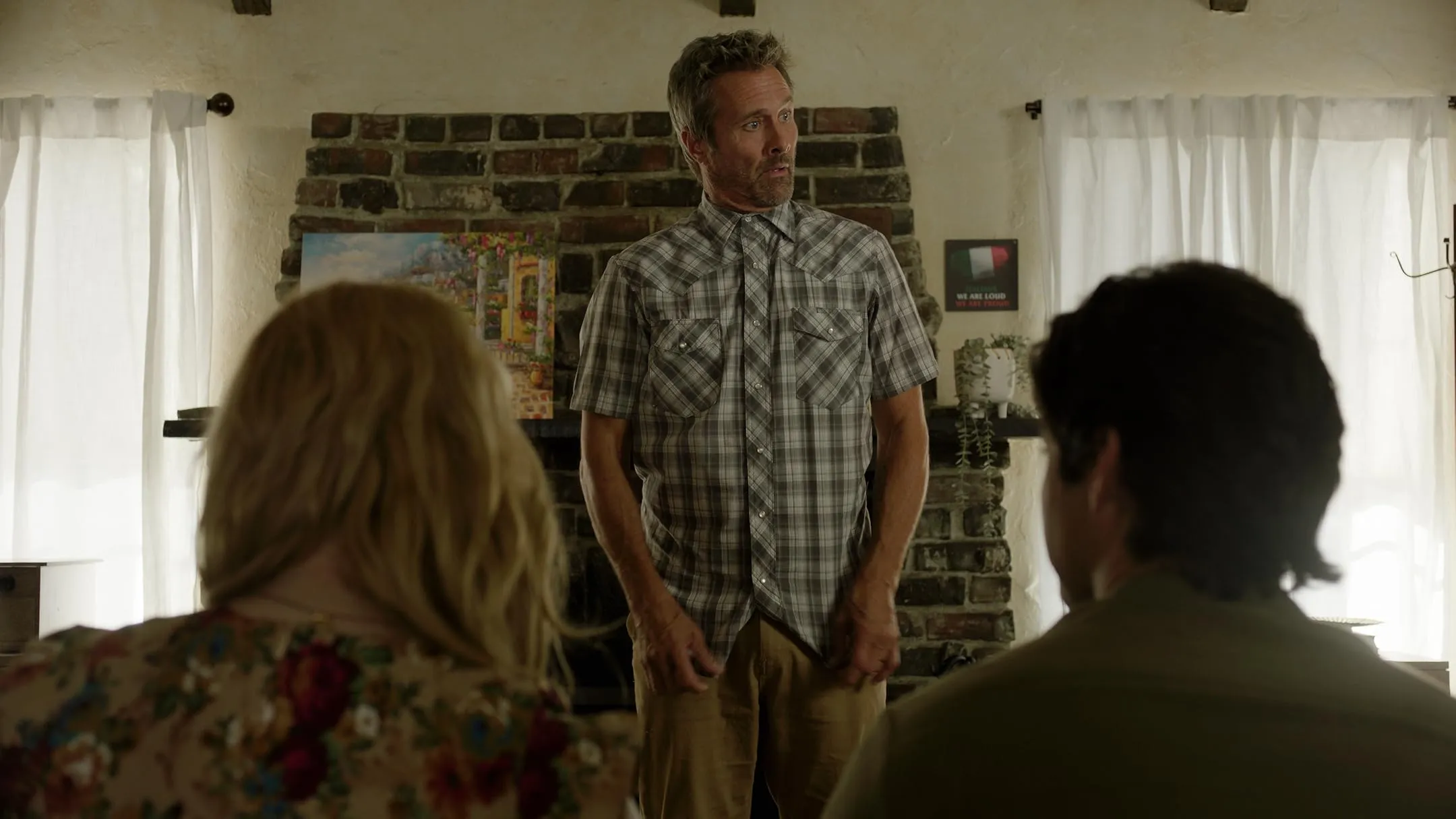“The Italians” ushers us into the familiar, yet perpetually unsettling, theater of an Italian-American family. Here, young Nico performs the timeless ritual: presenting his new love, Lily, to the dynastic heart of his kin, chiefly his mother, Angelina. The film sketches its initial strokes with the broad colors of comedy, for Lily is an inventory of Angelina’s unspoken disapprovals.
She is not of their tribe, a vegetarian in a pantheon of meat, a divorcee bearing the mark of a past life, and disinclined towards the expected lineage of children. The air, thick with the aroma of simmering sauces and louder pronouncements, promises a light, chaotic ballet of domestic discord.
Yet, beneath the laughter, one senses the ancient hum of cultural imperatives, the invisible architecture of belonging that can both nurture and confine, where the weight of generations presses silently upon the present moment.
The Confessional and the Feast: Narratives of Entrapment
The narrative itself seeks a kind of absolution, framed by the hushed confines of a confessional booth. Nico, Angelina, and her husband Vincenzo unspool their recent histories to the patient Father Joe, a structural choice that casts their domestic farces as acts already freighted with the need for reconciliation, or perhaps, resignation.
This filtered recollection paints the introduction of Lily not merely as a social call, but as a disruption to a carefully curated ecosystem. Angelina’s immediate recoil from Lily—a rejection rooted in Lily’s perceived deviations from the sacred script of Italian daughter-in-law—is the stone dropped into the family pond, its ripples spreading with an almost predetermined force.
The vegetarianism, the prior marriage, the ambivalence toward procreation: each is a negation of Angelina’s world, a small tear in the fabric of her expectations for her son’s life, and by extension, her own.
The ensuing days descend into a series of escalating comedies of discomfort, most notably around the ritual of the shared meal. These are not merely dinners; they are tribunals.
The re-emergence of Nico’s former girlfriend, Geena, a caricature of ostentatious Italian-ness, is a masterstroke of Angelina’s subtle warfare, a transparent maneuver that amplifies Lily’s alienation to an unbearable pitch, culminating in her flight from the table. Other relations orbit this central drama, their own quirks and allegiances adding to the cacophony, each a small testament to the intricate, often suffocating, dance of familial obligation.
Portraits in a Dimly Lit Room: Gazing Upon the Players
Angelina, as rendered by Michelle Danner, stands as the formidable matriarch, her domain the kitchen, her scepter the stirring spoon. She is a figure etched from tradition, her pronouncements less opinion than decree, her identity seemingly fused with the rituals of nourishment and the perpetuation of her lineage.
Yet, through the cracks in this formidable facade, one might glimpse a deeper fragility, a quiet terror of erasure, her fierce traditionalism a bulwark against an encroaching, indifferent modernity. Is her control a manifestation of love, or a desperate clinging to known forms in a formless void?
Lily, embodied by Abigail Breslin, enters this dense atmosphere as the quintessential alien, a mirror reflecting the family’s own unspoken anxieties. Her attempts to navigate this labyrinth are a study in quiet resilience, her very presence a question mark against their certainties.
She is the vegetarian at the carnivore’s feast, the atheist in the shadow of the crucifix, a modern soul adrift in an ancestral sea. Her performance hints at an inner landscape, a private world of her own, making her attempts to connect, or simply endure, all the poignant.
Nico, the son, is the fulcrum of these opposing forces, a study in filial piety stretched taut by new affection, his efforts at mediation the quiet struggles of a man attempting to serve two irreconcilable deities. Vincenzo, the husband, observes with the weary eyes of one long accustomed to these tempests, his occasional interventions the sighs of a man who knows the limits of his influence.
The periphery is populated by figures like Lucia, the grandmother whose sharp wisdom echoes Angelina’s own, and Geena, the ex-girlfriend whose vibrant vulgarity serves as a stark, unsettling counterpoint to Lily’s composure. Father Joe listens, a receptacle for these tangled human admissions, while Sal, the brother, adds another thread to the dense familial weave.
Feasts of Obligation, Crumbs of Connection
The film ostensibly celebrates the tenacity of family bonds, the fierce loyalty that defines such clans. Yet, one cannot ignore the undercurrent of obligation, the unspoken contracts that bind individuals to roles scripted long before their arrival.
The culture clash is not merely between Italian tradition and American modernity, but between the crushing weight of the collective and the fragile assertion of individual will. Lily’s struggle for acceptance is a quiet battle for the self, a plea to be seen beyond the categories imposed upon her.
Food, in this world, transcends mere sustenance; it is language, weapon, offering, and sacrament. Each meal is a stage for emotional warfare or tentative peace, where a plate of vegetarian pasta becomes a fragile olive branch, a tiramisu the repository of a hidden hope.
Yet, as the narrative veers from its comedic trajectory into the shadowed lands of marital strife and sudden illness—Angelina’s faltering heart—the laughter catches in the throat. This intrusion of mortality, of authentic suffering, strips away some of the performative layers.
It is in these moments, perhaps, that genuine connection flickers, born not of shared traditions but of shared vulnerability. The choice of love over rigid expectation is presented as a triumph, yet one wonders about the compromises made, the parts of the self eroded in the name of belonging. Is acceptance a true embrace, or merely the weary cessation of hostilities?
Framing the Familiar Cage
Michelle Danner’s dual role, as architect of this world and its central, formidable figure, invites contemplation on the artist’s relationship with their own heritage—a dance of critique and embrace. The film’s style, a broad comedy that knowingly deploys stereotypes, feels at times like a self-aware acknowledgment of these cultural shorthands, these masks worn for so long they have grafted onto the skin.
There is warmth, undeniably, but it is the warmth of a hearth whose fire might also consume. The Ricci home, with its curated relics of lineage—the crest, the copper, the photographs—is less a lived-in space than a museum of identity, each object a testament to a past that continues to dictate the present.
The pacing, often brisk, mirrors the relentless momentum of family life, a current that sweeps individuals along. The eventual balance struck between humor and pathos feels like an attempt to find meaning in the mundane, a quiet assertion that even within the predictable confines of domestic drama, moments of fleeting grace, or perhaps just bearable existence, can be found. The film offers a familiar portrait, earnest in its depiction of the family cage, gilded though it may be.
The Italians Released on April 11, 2025, The Italians is available for streaming on various platforms.
Full Credits
Director: Michelle Danner
Writer: Lisa Phillips Visca
Producers and Executive Producers: Michelle Danner, Valerie Debler, Brian Drillinger, Alexandra Guarnieri, Teferi DeJene, Lisa Phillips Visca
Cast: Abigail Breslin, Matthew Daddario, Lainie Kazan, Rob Estes, Perrey Reeves, David DeLuise, Olivia Luccardi, Michelle Danner, Luca Riemma, Roger Gershman
Director of Photography (Cinematographer): Federico Verardi
Editor: Teferi DeJene
Composer: Holly Amber Church
The Review
The Italians
"The Italians" offers a familiar tableau of familial chaos, yet beneath its comedic veneer lie unsettling questions about the prisons of tradition and the fragile quest for selfhood within the collective. While its embrace of convention sometimes mutes its deeper resonances, the film occasionally allows a starker, more poignant human drama to surface, reminding us that even in the loudest rooms, the quiet anxieties of existence persist. It’s a cinematic meal that, while ostensibly comforting, leaves a lingering aftertaste of existential inquiry.
PROS
- Moments that pierce through stereotype to reveal authentic human vulnerability.
- Explores the profound, often burdensome, weight of cultural and familial expectations.
- Michelle Danner's central performance embodies the tension between matriarchal strength and underlying fragility.
- The shift towards dramatic themes introduces a welcome, if somber, depth.
CONS
- Often leans heavily on familiar comedic tropes, blunting its sharper insights.
- The narrative arc occasionally smooths over the very complexities it unearths.
- Tonal shifts between farce and drama can feel abrupt rather than seamlessly integrated.
- Predictable elements may detract from the unsettling questions it raises.



















































